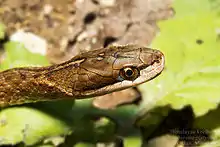Himalayan keelback
The Himalayan keelback (Herpetoreas platyceps) is a species of grass snake in the family Colubridae. The species is endemic to South Asia.
| Himalayan keelback | |
|---|---|
 | |
| at Mussoorie, India | |
| Scientific classification | |
| Kingdom: | Animalia |
| Phylum: | Chordata |
| Class: | Reptilia |
| Order: | Squamata |
| Suborder: | Serpentes |
| Family: | Colubridae |
| Genus: | Herpetoreas |
| Species: | H. platyceps |
| Binomial name | |
| Herpetoreas platyceps (Blyth, 1854) | |
| Synonyms[1] | |
| |
Geographic range
H. platyceps is known from India along the sub-Himalayan region, Nepal, Bangladesh, Pakistan, Bhutan and China between 1000 and 3600 m elevation (about 3,300 to 11,800 feet).
Description
H. platyceps has the following characteristics: Eye moderate; rostral just visible from above; suture between the internasals as long as that between the pre-frontals or shorter; frontal longer than its distance from the end of the snout, shorter than the parietals; loreal longer than deep ; one preocular (sometimes divided); two or three postoculars; temporals 1+1, or 1+2, or 2+2; 8 upper labials, third, fourth, and fifth entering the eye; 4 or 5 lower labials in contact with the anterior chin shields, which are much shorter than the posterior chin shields.
Dorsal scales in 19 rows, faintly or feebly keeled. 177-235 ventrals; anal divided; subcaudals 75-107, also divided.
Olive-brown above, with small black spots; frequently two black parallel lines or an elliptic marking on the nape; a light, black-edged streak on each side of the head, or a black line from eye to gape (corner of mouth); belly yellowish, with or without blackish dots; frequently a black line or series of elongate blackish spots along each side of the belly; lower surface of tail frequently mottled with blackish; throat sometimes black. In life, a coral-red band is said to run along the ends of the ventrals.[2]
Total length 90 cm (3 feet); tail 23 cm (9 inches).[3]
Notes
- Wall, 1923
- G.E. Shaw et al., 1939
- Malnate, 1960
- Guo et al., 2014
References
- Herpetoreas platyceps at the Reptarium.cz Reptile Database
- Boulenger GA (1890). The Fauna of British India, Including Ceylon and Burma. Reptilia and Batrachia. London: Secretary of State for India in Council. (Taylor and Francis, printers). xviii + 541 pp. (Tropidonotus platyceps, pp. 343-344).
- Boulenger GA (1893). Catalogue of the Snakes in the British Museum (Natural History), Volume I., Containing the Families...Colubridæ Aglyphæ, Part. London: Trustees of the British Museum (Natural History). xiii + 448 pp. + Plates I-XXVIII. (Tropidonotus platyceps, p. 248).
Further reading
- Blyth E (1855). "Notices and descriptions of various reptiles, new or little known [part 2]". J. Asiatic Soc. Bengal, Calcutta 23 (3): 287-302 [1854].
- Cardew AG (1896). "A rough key to the identification of Indian ophidia". J. Bombay Nat. Hist. Soc. 10: 585-596.
- Hubrecht AAW (1882). "List of reptiles and amphibians brought from British India by Mr. Francis Day". Notes Leyden Mus., Leiden 4: 138-144.
- Kramer E (1977). "Zur Schlangenfauna Nepals ". Rev. suisse Zool. 84 (3): 721-761. (in German).
- Malnate EV (1966). "Amphiesma platyceps (Blyth) and Amphiesma sieboldii (Günther): sibling species (Reptilia: Serpentes)". J. Bombay Nat. Hist. Soc. 63 (1): 1-17.
- Schleich HH, Kästle W (2002). Amphibians and Reptiles of Nepal. Königstein: Koeltz Scientific Books. 1,200 pp.
- Shaw GE, Shebbeare EO, Barker PE (1939). "The snakes of northern Bengal and Sikkim, Part 4. The colubrine snakes". J. Darjeeling Nat. Hist. Soc. 13: 114-123.
- Shaw GE, Shebbeare EO, Barker PE (2000). The snakes of Sikkim and Bengal [reprint]. Dehli: Asiatic Publishing House. 125 pp.
- Steindachner F (1867). "Ueber drei neue Schlangenarten [Calamaria philippinica]". Verh. zool.-botan. Ges. Wien 17: 513-516. (in German).
- Tillack F (2003). "Über die Verbreitung und Biologie der Himalaya-Gebirgswassernatter Amphiesma platyceps (Blyth 1854) und einen Fall von Amphigonia retardata (Serpentes: Colubridae: Natricinae) ". Sauria 25 (1): 21-27. (in German).
- Wall F (1913). "A new snake of the genus Tropidonotus from the Eastern Himalayas. Tropidonotus Firthi, spec. nov. ". J. Bombay Nat. Hist. Soc. 23: 166.
- Wall F (1923). "A Hand-list of the Snakes of the Indian Empire. Part 2". J. Bombay Nat. Hist. Soc. 29: 598-632.